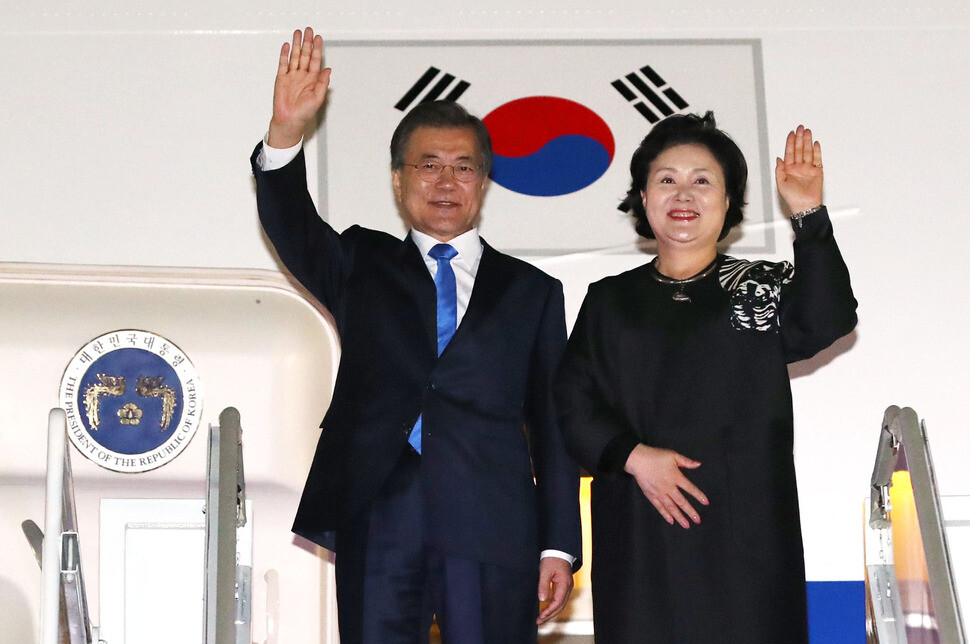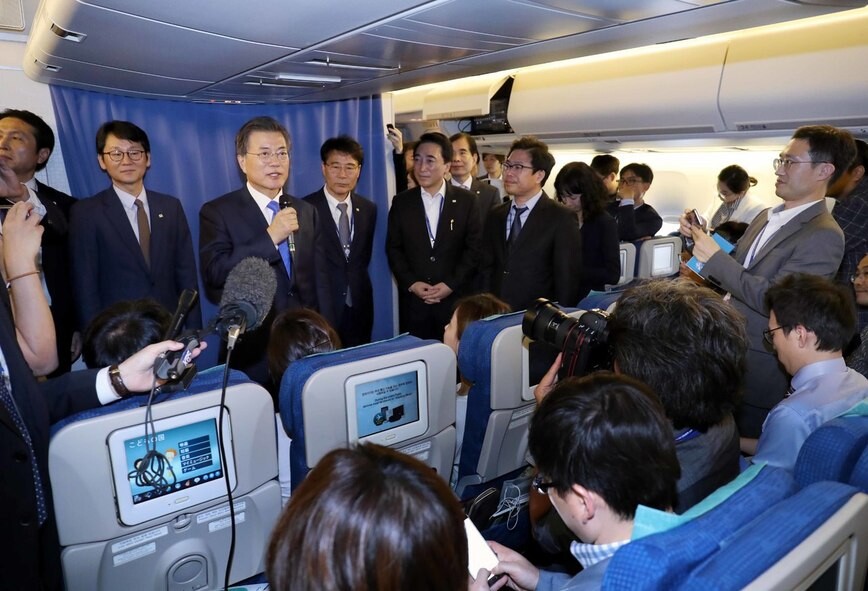hankyoreh
Links to other country sites 다른 나라 사이트 링크
Moon offers upbeat appraisal of his UN trip

“I don’t think [the North Korean nuclear issue] will be resolved in the short term, but I do see us as being in the process of moving toward a resolution. International coordination is working out well on the whole, and from the Republic of Korea’s standpoint, we are receiving support and cooperation, so I think the international response is going well.”
President Moon Jae-in assessed the diplomatic outcome of his recent five-day trip to the US on Sept. 21 while flying back to Seoul after completing his visit. His appraisal was that with South Korea, the US, and Japan coordinating on a trilateral basis, he had stirred the embers of a potential peaceful diplomatic resolution to the nuclear issue through expanded multilateral diplomacy and an affirmation of the unacceptability of war on the Korean Peninsula.
As recently as his Berlin statement in July, Moon was stressing the importance of dialogue with Pyongyang, pointing to military talks and divided family reunions as specific examples. This time, he emphasized peace, drawing on the symbolic examples of the UN itself and the “candlelight revolution” that led to his presidency. It was a reflection of how rapidly the situation has changed over the past two months with North Korea’s sixth nuclear test and other provocations.
In his latest speech before the UN General Assembly and summits with the US, Japanese, and other heads of state, Moon stressed that intensive sanctions and pressure are the only way to achieve peace. It’s a message he continued in his talk with reporters on board the aircraft.
“It’s tough to find any other solutions right away at a time when tensions are as high as they are now,” he said.
“At the moment, there is no other approach on North Korea except unanimous pressure from the international community,” he continued.

Under the circumstances, even Moon’s agreement with the US and Japanese leaders on plans to “pursue North Korea’s denuclearization by peaceful means” can be seen as a significant achievement. At the very least, it helps reduce some of the current tensions, which have been high enough to spark talk of “military options.” In particular, Moon attempted to actively use the upcoming Pyeongchang Winter Olympics as leverage to reduce escalating conflicts, calling for the participation of North Korean athletes and inviting various leaders to visit.
In his UN General Assembly speech, Moon called for a “judicious combination between multilateralism and the basic pillar of northeast Asian security” – stressing the UN’s approach of achieving peace through multilateral dialogue as a way of reaching a fundamental resolution on the North Korean nuclear issue. In his talk with reporters, Moon was asked to explain whether he was referring to the Six-Party Talks or a completely new framework for negotiation.
“It’s something that can be explored in any kind of dialogue framework, be it bilateral, trilateral, four-party, or six-party talks,” he replied.
Instead of offering a specific framework for multilateral diplomacy to achieve peace on the peninsula, Moon answered that a “fundamental and permanent peace regime can only be achieved in a case like the European Union, with an economic community and multilateral security cooperation system in Northeast Asia.”
It can be pointed out that one drawback was Moon’s failure to make much headway toward coordination with China and Russia, which hold two of the keys toward his dream of a multilateral security cooperation regime. There is a concern that the announcement of an additional US executive order for independent North Korea-related sanctions targeting China and Russia could further restrict diplomacy opportunities with Beijing and Moscow.
By Lee Jung-ae and Kim Bo-hyeop, staff reporters
Please direct questions or comments to [english@hani.co.kr]

Editorial・opinion
![[Column] Season 2 of special prosecutor probe may be coming to Korea soon [Column] Season 2 of special prosecutor probe may be coming to Korea soon](https://flexible.img.hani.co.kr/flexible/normal/500/300/imgdb/original/2024/0426/3317141030699447.jpg) [Column] Season 2 of special prosecutor probe may be coming to Korea soon
[Column] Season 2 of special prosecutor probe may be coming to Korea soon![[Column] Park Geun-hye déjà vu in Yoon Suk-yeol [Column] Park Geun-hye déjà vu in Yoon Suk-yeol](https://flexible.img.hani.co.kr/flexible/normal/500/300/imgdb/original/2024/0424/651713945113788.jpg) [Column] Park Geun-hye déjà vu in Yoon Suk-yeol
[Column] Park Geun-hye déjà vu in Yoon Suk-yeol- [Editorial] New weight of N. Korea’s nuclear threats makes dialogue all the more urgent
- [Guest essay] The real reason Korea’s new right wants to dub Rhee a founding father
- [Column] ‘Choson’: Is it time we start referring to N. Korea in its own terms?
- [Editorial] Japan’s rewriting of history with Korea has gone too far
- [Column] The president’s questionable capacity for dialogue
- [Column] Are chaebol firms just pizza pies for families to divvy up as they please?
- [Column] Has Korea, too, crossed the Rubicon on China?
- [Correspondent’s column] In Japan’s alliance with US, echoes of its past alliances with UK
Most viewed articles
- 1‘We must say no’: Seoul defense chief on Korean, USFK involvement in hypothetical Taiwan crisis
- 2[Column] Season 2 of special prosecutor probe may be coming to Korea soon
- 3N. Korean delegation’s trip to Iran shows how Pyongyang is leveraging ties with Moscow
- 4Korea sees more deaths than births for 52nd consecutive month in February
- 5Amnesty notes ‘erosion’ of freedom of expression in Korea in annual human rights report
- 6[Reportage] On US campuses, student risk arrest as they call for divestment from Israel
- 7[Editorial] New weight of N. Korea’s nuclear threats makes dialogue all the more urgent
- 8‘Weddingflation’ breaks the bank for Korean couples-to-be
- 9[Column] Has Korea, too, crossed the Rubicon on China?
- 10[Column] Park Geun-hye déjà vu in Yoon Suk-yeol